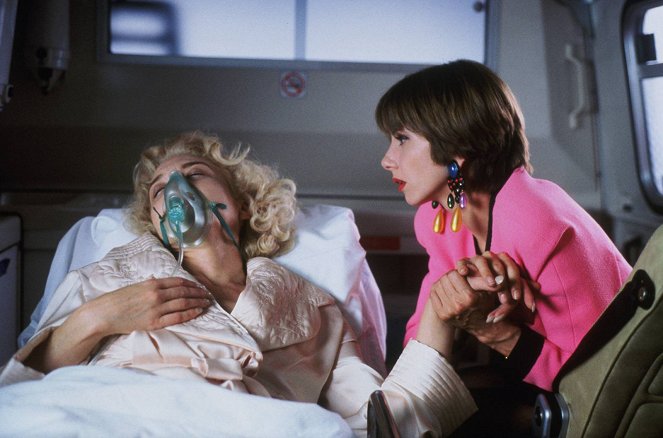Directed by:
Pedro AlmodóvarScreenplay:
Pedro AlmodóvarCinematography:
Alfredo MayoComposer:
Ryūichi SakamotoCast:
Victoria Abril, Marisa Paredes, Miguel Bosé, Féodor Atkine, Javier Bardem, Rocío Muñoz, Anna Lizaran, Cristina Marcos, Agustín Almodóvar, Mayrata O'Wisiedo (more)Plots(1)
A famous torch song singer returns to Spain from Mexico with the hope of being reunited with the daughter she previously abandoned. On her arrival she discovers her daughter is planning to marry one of her ex-lovers, a situation that can only end with murder. (StudioCanal UK)
Reviews (2)
All the characteristics of Almodóvar's work are present here, but it is far from being a masterpiece. I gave him 45 minutes to captivate me into the world of his characters, but it probably wasn't worth it because as the minutes went by, I felt increasing indifference toward these characters and their problems. It's once again a matter of relationships, where emotions are sold like in a Latin American soap opera, and once again the female characters take the lead, which Almodóvar handles much better than the males, once again the motif of transvestism appears, etc. But if Almodóvar made movies at this level, he certainly wouldn't become the star of the festival audience. This film has good reviews primarily due to the director's reputation and his numerous fan base. Overall impression: 40%. Some movies bore you to the point where you rush to find out the point as soon as possible, and there are those where you are no longer interested in the outcome of the story. And I felt more of the latter with this film...
()
High Heels is a film on the verge of a nervous breakdown. It is never far from slipping into Almodóvar’s self-parody, for which the very act of recycling previous motifs is more important than storytelling. If not for the strong central theme, which comprises the contradictory relationship between a mother and daughter who are seeking a way back to each other after many years of estrangement (just as young Spaniards tried to understand their homeland after Franco’s death), there would be nothing to hold the film together. It is too obvious that the plot was developed by cutting and pasting together the themes of famous “women’s” films (Stella Dallas, Mildred Pierce, All About Eve). The attempt to pay tribute to as many of the old masters as possible leads to the fact that, approximately every twenty minutes, there is a surprising plot twist and a slight change of genre (including a short musical interlude), none of which is quite “pure” (the grotesque police investigation). Though the film does not give us a chance to get bored, its rapid changing of moods makes it impossible to ever go more in depth and properly introduce the heroines. The constant referring to the fabricated nature of the narrative is not – as in Tie Me Up! Tie Me Down! and Broken Embraces – justified by the environment in which the story takes place (at most by the fact that at least two characters make a living by acting) and hinder any feeling of compassion for the protagonists, who, with the exception of a few authentic-seeming scenes (the dialogue in the church), serve only as lifeless structural elements. Despite its counterproductive anti-illusiveness (a phrase associated with killing, I admit), I liked how Almodóvar is continuing with his queer crusade against genre clichés. There are unreadable men who may have many faces, but still they desire the same thing and, in shots with a strictly symmetrical composition, divide (women) instead of connecting. In line with the distinctive artistic stylisation, the elegantly dressed ladies do not fulfil the role of mere decorative objects, but instead confidently use their fragile appearance (starting with a flashback from childhood, which was probably supposed to be a reference to Cria Cuervos). The father figure was excluded from the conventional family model and the women’s happiness does not depend on their relationships with men (the erotic scene between Rebeka with the man who had portrayed her mother only moments before could also be interpreted at the female level). In the end, the plot paradoxically serves to break down other, gender constructs. As ambivalent as this fact is, that is my attitude to High Heels as a whole, a postmodern film for better or worse. 75%
()


Ads